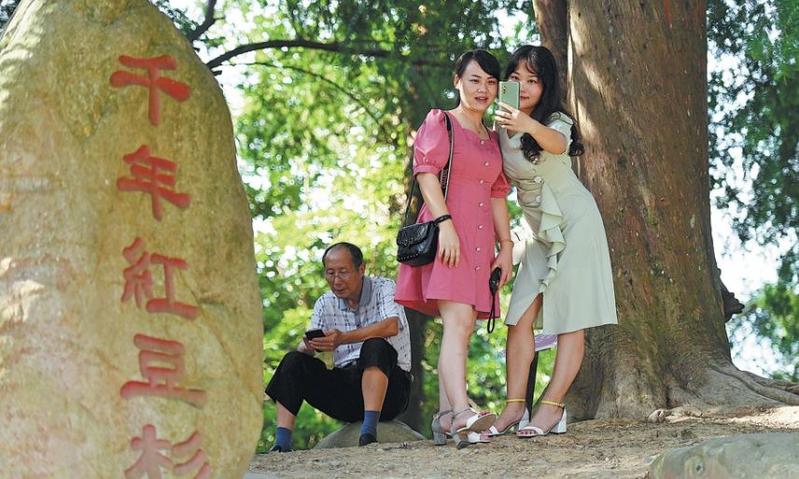 In this August 2020 file photo, visitors take photographs at a park in Wuning county, Jiangxi province. (WEI XIAOHAO / CHINA DAILY)
In this August 2020 file photo, visitors take photographs at a park in Wuning county, Jiangxi province. (WEI XIAOHAO / CHINA DAILY)
Located on scenic Jiuling Mountain, the Changshui village in Wuning county, Jiangxi province, is leveraging its strengths like a picturesque location and lush environment to develop local tourism and thereby become prosperous.
A series of supportive measures are afoot to promote nature-based tourism, including offers of free exterior decoration of houses for residents who are keen to foray into the business of homestay services
Nearly 94 percent of the village's 8,400 hectares is covered with forests and creeks, which keeps temperature low and air pure, helping create habitats for wildlife.
What's more, the local scene creates a natural noise barrier against the outside world for the 2,269 local residents.
The local government has been promoting environmental protection and ecological preservation since 2004. Officials believe that a good environment and an enhanced ecosystem will open doors to more wealth, said Yu Diewen, an official with Changshui village.
A series of supportive measures are afoot to promote nature-based tourism, including offers of free exterior decoration of houses for residents who are keen to foray into the business of homestay services.
About 50 million yuan (US$7.25 million) has been invested on renovation of public toilets, parking lots, and other infrastructure.
Years of green efforts in Changshui have borne fruit already. Some of the poverty-stricken families now eke out a decent livelihood from tourism-related activities.
Changshui's average annual per-capital income has risen to 21,600 yuan, with 8,910 yuan coming from tourism in 2019.
ALSO READ: Guizhou cashes in on cool climate
This year, despite the impact of COVID-19 on the regional economy, the village has seen the opening of six new restaurants and 12 new homestay options. The May Day holiday recorded over 30,000 visits to the village.
Local resident Lu Xianrong is one of the beneficiaries of the village's embrace of tourism. After retiring from the armed forces in 2018, Lu let go of an opportunity to land a job reserved for veterans. Instead, with encouragement from his family, he started up with a restaurant and a homestay business in April.
We now earn nearly 60,000 yuan per month on average. The future looks very promising to us.
Lu Xianrong, restaurant and homestary business owner
Lu said: "My family was very supportive. We saw big opportunities from the local government's promotion of nature-based tourism, so we were very optimistic about the industry's future and wanted to ride the wave.
"We started planning in 2019 with two of my brothers and a sister. We invested over 1 million yuan into it. The local government helped us with the exterior decoration (of the homestay accommodation).
"Our startups have shaped up well so far. On a normal day, about 50 people dine in our restaurant. During the May Day holiday, there were 100 customers per day on average.
"We now earn nearly 60,000 yuan per month on average. The future looks very promising to us."
But the scene here was not always promising. Before many residents in Changshui jumped on the tourism bandwagon, the village struggled to stay afloat until as recently as the first decade of this millennium.
"You could barely see trees in the village or surrounding areas, but only bushes and shrubs because local villagers bet on cutting down trees to sell them (as firewood or furniture raw material) to make a living," said Yu, the village official.
ALSO READ: 'Green Great Wall' keeps poverty and sand at bay
Weng Shenglin, 69, was one of the villagers who cut down trees to make a living until 2003. He said: "Many people were like us back at that time. They chipped the trunk into mulch, or cut it into smaller blocks and hauled them away. But the tree roots remained in the ground. Forests near our village looked quite bare."
Weng and his family stopped the business in 2004. At that time the local government banned felling and selling trees, and also rolled out a series of measures to protect the local environment and preserve the ecology.
Since 2018, Weng has been working as a forest keeper. His daily work includes tasks like checking if trees are threatened by insects or disease, and stopping tourists from behaving in a way that could harm trees.
Weng said the local government pays him about 20,000 yuan per year for his services.
ALSO READ: Jiangxi's crayfish companies serve delicious profits
A tree feller-turned-forest protector, Weng said he is proud of the difference he has made to his village and its neighborhood. His twilightyear second career has made him environmentally conscious and he is much happier for it, he said.
"In the past few years I've been seeing the forests recover and the village is starting to have magnificent scenery all around. Our living environment has also been greatly enhanced. Recent years have seen an increasing number of tourists. People in my village earn much more now, thanks to the improved environment. What a contrast to the past when we recklessly cut down trees," Weng said.


